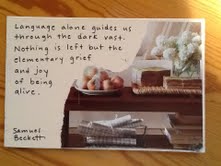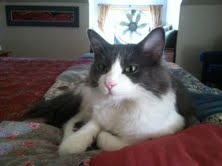 No final chemo this week. We’re so disappointed. I had wanted to get this over with and start repairing, but my white blood count, especially the neutrophils, are too low. The platelet count has come up and the hemoglobin is okay, but . . . The nurse said she was surprised about the white count, since I had an injection of Neulasta to prod my bone marrow into production. “It’s the cumulative effect of all that radiation as well as the chemo,” she said.
No final chemo this week. We’re so disappointed. I had wanted to get this over with and start repairing, but my white blood count, especially the neutrophils, are too low. The platelet count has come up and the hemoglobin is okay, but . . . The nurse said she was surprised about the white count, since I had an injection of Neulasta to prod my bone marrow into production. “It’s the cumulative effect of all that radiation as well as the chemo,” she said.
I put our rhododendrons here to cheer me up. The delay made me irritable and, frankly, depressed. I didn’t expect that reaction, since generally there’s been a measure of equanimity with all this. Then I remembered a Zen story:
The wise Chinese farmer’s horse ran off. His neighbor came to console him, but the farmer said, “Who knows what’s good or bad?”
When his horse returned the next day with a herd of horses following her, the foolish neighbor came to congratulate him on his good fortune.
“Who knows what’s good or bad?” said the farmer.
Then, when the farmer’s son broke his leg trying to ride one of the new horses, the foolish neighbor came to console him again.
“Who knows what’s good or bad,” said the farmer.
When the army passed through, conscripting men for war, they passed over the farmer’s son because of his broken leg. When the foolish man came to congratulate the farmer that his son would be spared, again the farmer said, “Who knows what’s good or bad?”
When does this story end? There’s no fixed “good” or “bad.” They’re beliefs, judgments, ideas based on limited knowledge as well as on the inclinations of our minds.
 I’ve been reading a lot. I haven’t had energy for much else. The above story comes from Buddhism Plain and Simple, by Steve Hagen, one of the clearest and best books on the subject I’ve read. Besides things I’ve mentioned recently in blog posts, I’ve read Lady Almina and the Real Downton Abbey (a gift) by the Countess of Carnavon, the current owner of the estate. I appreciated the intimate view of the beginning of WWI and the discovery of King Tut’s tomb. I’ve skimmed back through The Emperor of All Maladies, for cancer details for some poems. I’ve read Beautiful Ruins, by Jess Walter. I’d read his novel, The Zero, several years ago. Now I’m going to get The Financial Lives of the Poets. I’ve read Siri Hustvedt’s What I Loved, an amazing psychological exploration of an artist, a critic, and their relationships. I read Gillian Flynn’s Gone Girl and found it richer than I’d thought it would be, in the exploration of the way her characters construct a “self” to present to the world. And, sigh, I have to admit I’d never read Little Women! So I did. It’s even more sappy and moralistic than I expected, but I dutifully slogged my way through.
I’ve been reading a lot. I haven’t had energy for much else. The above story comes from Buddhism Plain and Simple, by Steve Hagen, one of the clearest and best books on the subject I’ve read. Besides things I’ve mentioned recently in blog posts, I’ve read Lady Almina and the Real Downton Abbey (a gift) by the Countess of Carnavon, the current owner of the estate. I appreciated the intimate view of the beginning of WWI and the discovery of King Tut’s tomb. I’ve skimmed back through The Emperor of All Maladies, for cancer details for some poems. I’ve read Beautiful Ruins, by Jess Walter. I’d read his novel, The Zero, several years ago. Now I’m going to get The Financial Lives of the Poets. I’ve read Siri Hustvedt’s What I Loved, an amazing psychological exploration of an artist, a critic, and their relationships. I read Gillian Flynn’s Gone Girl and found it richer than I’d thought it would be, in the exploration of the way her characters construct a “self” to present to the world. And, sigh, I have to admit I’d never read Little Women! So I did. It’s even more sappy and moralistic than I expected, but I dutifully slogged my way through.
I’ve read a lot of poetry, of course. Right now I’m reading Tourist in Hell by Eleanor Wilner. I’ve always admired her intelligent poems. The poems in this book are relentlessly political but all fresh. I do, after a while, long for more of the intimate “I.” Here’s the beginning of one, though, that does conjure up the personal, the disappointment that registers personally. It’s called “Cold Dawn of the Day When Bush Was Elected For a Second Term.”
I am jealous today of my dog of his ignorance of all this / of his unerring instinct for what matters and his general aesthetic / for meat and his inability to vote / against his own best interests. . . . .
How to pull this post together. Disappointment and reading. I guess all my life I’ve had my nose in a book while I’ve waited for disappointment to settle down in me and gradually dissipate. Not to escape—it’s too easy to say that—but to burrow down into others’ lives—of course they’re no less real when made up—where there is necessarily some perspective. And maybe inspiration. People have read the lives of saints and martyrs for centuries for that purpose.
Good grief, this is such a small disappointment, a week’s delay! But Wally the Buddha Cat says that even the smallest irritations can feel huge when looked at straight on. He says seeing the gossamer fabric they’re made of includes both straight-on looking, as well as finding them located in the toy mouse, or whatever we call “other.” 
